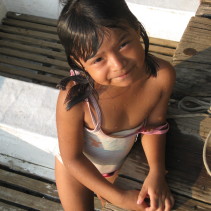Parenting at Casa Guatemala
Distributed to an email list and published online (2010)
Inoticed her picture in line. We were all headed to school and she was fingering a little piece of paper, looking down at it without speaking. The air around her was heavy, and once I read the inscription I saw why. On the top of the crayola coloring of a princess were the words: “To my pretty mama.” The handwriting was childish chicken scratch, the kind most parents prize and put up on the refrigerator. I connected the picture with what she had asked me the night before as she was getting ready for bed. “When’s Mother’s Day?” When she’d asked I’d simply said some time in May, I wasn’t sure of the exact date. I didn’t dwell on it because I didn’t think the meaning of Mother’s Day could hold very much importance in an orphanage. I could see by Daniella’s picture that I was wrong.
I think what surprised me most was not that Daniella was wondering about Mother’s Day, but that she could still hold a place in her heart for a woman who only bothered to see her once a year. I had been told about Daniella and the mother who came to see her so rarely. I wondered about this woman, how she could go so long without seeing her daughter, how she could let her stay at an orphanage every other weekend instead of taking her home for a visit as many of the girls’ families did. What, really, makes a mother? Is a mother someone who gives birth to you? Or is a mother the person who nurses you back to health when you’re sick, hangs your pictures up on the wall, makes a big deal of your report card, and brushes the tears from your eyes when you scrape your knee?
The responsibility of being even a stand-in parent can be overwhelming. You truly get the good and the bad. Sometimes, in an orphanage, the bad can be pretty bad. You have girls who have lived in the orphanage most of their lives and are competing for seniority amongst each other and even you. You have girls who are dealing with traumas and bad hands they were dealt before the orphanage.
We have an older girl in Niñas Pequeñas, a nine year old whose name I won’t mention, who still pees the bed. When she was four she went through a trauma in which masked men broke into her house and hurt people. She doesn’t talk about it very much but every night she wets herself. We were advised on a method of breaking this habit, psychologically-based bed wetting, from a psychology magazine. The method starts with waking the child up three hours after she has gone to sleep. In the perfect world, the child would have an alarm clock and wake up on her own because the goal is to make the child responsible for her own problem, as well as solving it. Here at Casa Guatemala, we don’t have spare alarm clocks. Eleni and I take turns setting our cell phone alarms and waking the girls up. It is a constant struggle. I normally have to lift this particular child out of bed and set her feet on the floor, then hold her up while she gets her balance. Most of the time she is simply sleep walking when I get her up. Her eyes still closed, she always stumbles to the first bathroom stall and then refuses to go any further. Guatemalans have this strange habit of clicking their tongues when they are unhappy. It’s a way of throwing attitude while conveniently giving you a terribly contemptuous facial expression. I am the recipient of this expression and tongue click every other night.
If she would then pee, everything would be fine. But she never does. She stands in front of the toilet in her underwear, stomping her foot, clicking her tongue, and shooting murderous looks at me with her eyes closed. I swear, I may never be scared of people in the United States again after being so actively hated, at moments, by Guatemalan orphans. It usually takes about 15 minutes of me standing there before she will finally sit down on the toilet and pee.
But sometimes you have to be careful what you wish for. The entire time I am waiting for this kid to go to the bathroom I am rubbing sleep from my eyes and waiting for the sound of liquid on toilet bowl. One night, I looked down to see her peeing beside the toilet. Another night we didn’t even make it to the bathroom. She found her balance once I got her out of bed and then just peed right there in the middle of the girls’ bedroom.
There are moments, cleaning up pee and puke, when volunteering here becomes the best birth control in the entire world. I can’t help but think that parenting is tough. I wonder at all of the things I put my own parents through. I’m certain pee and puke weren’t the worst of it. I know I rolled my eyes and acted illogically and stomped my feet. I know I acted hatefully towards them at times and hurt their feelings, much like my girls do to me now.
When I first got to Casa Guatemala I read something in a book that stopped me dead in my tracks. It went something like, “Most of the injustices in the world exist because someone doesn’t stop to think how the other guy must feel.” And it’s so true.
As I led Daniella and the other girls to school, that quote was running through my mind. I was wishing her mom could see it and put herself in the place of a little girl on the brink of adolescence, a little girl whose main hope in life was that her pretty mama would want her.


